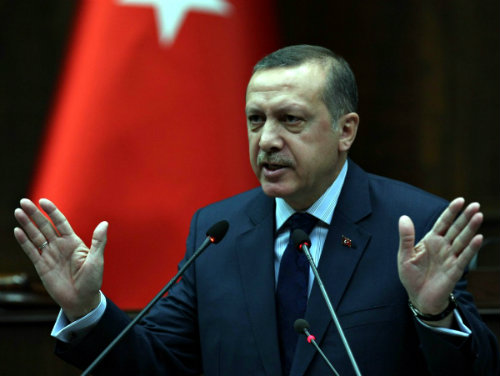Does pro-Kurdish BDP risk losing legitimacy in Turkish parliament?
The pro-Kurdish Peace and Democracy Party (BDP) which sees itself as the representative of the country’s Kurdish population in Parliament — is drawing closer to losing its legitimacy as a political body as it is unable to sufficiently distance itself from the terrorist Kurdistan Workers’ Party (PKK) and fails to contribute to the solution of the Kurdish issue, according to Turkey’s political analysts.
What made analysts come to such a conclusion is a series of recent developments in Turkey that drew strong reactions from Turkish society. One is related to footage distributed to the press after a BDP deputy embraced a PKK terrorist and had a very friendly talk with him during a visit of the party’s members to southeastern Turkey last week. In following statements, some BDP deputies voiced support of their colleague, saying, “We do not see PKK members as terrorists.”
A group of BDP deputies driving in Hakkari on Aug. 18 were stopped by a group of PKK militants as they entered Şemdinli, a district where the Turkish military has intensified its operations against the terrorist group over the past few months. The deputies, who have been accused of maintaining close ties to the terrorist group, talked with the terrorists for at least half an hour, drawing anger from most segments of society as the entire meeting was filmed. At the end of their chat, BDP Co-chair Gülten Kışanak gave the terrorists a goodbye hug.
Celal Yıldız, deputy chairman of the Rights and Freedoms Party (HAK-PAR) — a smaller pro-Kurdish party — told Sunday’s Zaman that the BDP has opened its legitimacy up to debate as it was working to legitimize both the identity and activities of the terrorist PKK.
“The BDP faces a dilemma that is hard to explain. On the one hand, it is asking for democratic autonomy and on the other hand, it is not hiding its organic ties with the armed fight [the PKK] in the mountains. They both say they represent civilian politics and point to İmralı and the Kandil Mountain [PKK leaders there] as interlocutor for the solution of the Kurdish question. Politics cannot be made in this way. Weapons are blocking civilian politics. Calls are coming both from within Turkey and abroad for the BDP to distance itself from the PKK. But they [BDP] will not do it because both the BDP and the PKK come from the same grass roots,” Yıldız stated.
The EU has on many occasions in the past called on BDP deputies to distance themselves from the terrorist PKK. There have been similar calls from within Turkey; however, the calls have gone unanswered by the party so far.
According to International Terrorism and Transnational Crime Research Center (UTSAM) Director Süleyman Özeren, the BDP is reluctant to sever its ties with the PKK because it knows that it will not exist as a political party without the support of the terrorist group. The PKK also needs the BDP for the continuation of its existence, Özeren said. “The PKK wants to maintain its existence with violent acts. It also needs the BDP to continue its political activities to maintain its existence.”
The PKK, listed as a terrorist organization by Turkey, the EU and the US, has been waging a bloody campaign in the Southeast since 1984. More than 40,000 people have been killed to date in the decades-long conflict.
For Participatory Democracy Party (KADEP) Deputy Chairman Nizamettin Maskan, it is not hard to understand why the BDP insists on maintaining close ties to the terrorist PKK. “Some deputies of the party were elected to Parliament thanks to the support of the PKK. For this reason, it is not possible for the BDP to sever its ties with the terrorist group,” he stated.
Maskan thinks that Turkey’s Kurdish question, for whose solution the PKK claims to be fighting, cannot be settled through the use of weapons. “Violence will never be a means for peace. Weapons should go silent for young people not to die any more,” he said.
Turkey’s Kurdish question has existed since the first years of the republic, but it turned violent in 1984 after the establishment of the terrorist PKK. The terrorist group operates from bases in the mountains of northern Iraq, and Turkish jets have periodically conducted bombing raids there.
Within its borders, the Turkish state has granted more cultural rights to Kurds as a means of easing the long-running conflict with a significant portion of the ethnic minority, but there is still a great deal of distrust between Ankara and many Kurds.
Kaplan: BDP is legal, PKK is illegal
Sunday’s Zaman also spoke to Hasip Kaplan, BDP parliamentary group deputy chairman, about the party’s ties with the terrorist PKK, and Kaplan said: “The BDP is a legal political party. And the other [PKK] is an illegal organization,” and stated that the BDP and the PKK do not have organic ties.
“As they do not have organic ties, we had better focus on how to solve the Kurdish question rather than discussing if the BDP should distance itself from the PKK or not,” Kaplan said.
Kaplan also said the Kurdish question, which he defined as Turkey’s most important problem, has turned violent because Parliament and politicians have failed to find a solution to it for many years. “Politicians should find an immediate solution to this problem in order not to allow a deeper separation in the society and clashes [between PKK terrorists and the Turkish military] to get fiercer,” he added.
26.08.2012
SOURCE: TODAYS ZAMAN




